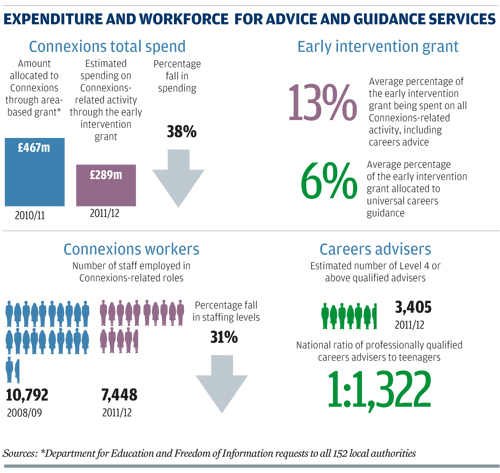Young people's advice services take a 180m hit
Andy Hillier
Monday, August 8, 2011
Local authorities have budgeted to spend almost 180m less on information, advice and guidance services for teenagers this year compared with last year, despite the fact that almost one in five young people are unemployed, a CYP Now investigation has found.

Figures obtained through freedom of information requests to all 152 local authorities in England reveal that councils plan to spend an estimated £289m on Connexions-related activities through their early intervention grant allocations in 2011/12 - 38 per cent less than the £467m central government allocated to Connexions work in 2010/11.
The government allocated more than £460m to Connexions in each financial year between 2008 and 2010, but the total allocation was not spent on the service in 2010/11 after cuts to funding were implemented in May last year.
Of the 101 councils that responded to the survey, 85 were able to state how much of their early intervention grant they had allocated to careers advice and guidance services. On average, they plan to spend 13 per cent of their grant on activities such as supporting and monitoring young people not in education, employment or training and providing careers advice. With the government allocating £2.2bn to the early intervention grant for 2011/12, this would equate to a national spend of £289m on Connexions-related activities.
Just four out of 10 councils were able to state how much of their grant would be invested in universal careers advice for young people. On average, they have set aside only six per cent to fund universal careers advice.
Katharine Horler, chair elect of the National Connexions Network, said the findings raise serious concerns about the standard of universal careers advice pupils will receive over the next academic year. "It's the universal services that have been hit hardest. If you're a Year 9 or 11 pupil or going into sixth form, what standard of service are you going to get? For an awful lot, I suspect the answer is nothing in this interim period until schools take on their new statutory duties in September 2012."
A duty on schools
The Education Bill, currently going through parliament, will place a duty on schools to provide access to impartial careers advice from September 2012 and will remove the requirement on councils to provide careers education. Councils will retain a statutory duty to support young people to remain in education or training and will be responsible for maintaining accurate data on young people to ensure services can be targeted at those in most need. But, until the bill is passed, local authorities remain legally required to provide careers advice and guidance services to all young people under the 2008 Education and Skills Act.
CYP Now's research also showed that staffing levels for Connexions and related services have been hit hard since 2008/09. An estimated 10,792 staff were employed in Connexions-related roles in 2008/09 compared with 7,448 today, a fall of 31 per cent.
However, the actual job losses of specialist advisers is probably much higher, as a number of local authorities that responded said they had switched to using other employees to take on the roles Connexions staff once filled.
Steve Higginbotham, president of the Institute of Careers Guidance, said he was concerned about other professionals providing careers advice: "Careers guidance should be delivered by qualified careers guidance professionals."
The study revealed that nationally there is only one full-time equivalent Level 4 or above qualified careers adviser to every 1,322 young people aged 13 to 19.
Horler said: "Before the cuts, a ratio of one professionally qualified adviser to every 800 young people was considered right for universal work. So they're facing more than a 60 per cent increase in the overall numbers they're having to work with and potentially having to help more vulnerable young people who need more individual support as councils focus on working on those with the greatest needs."





